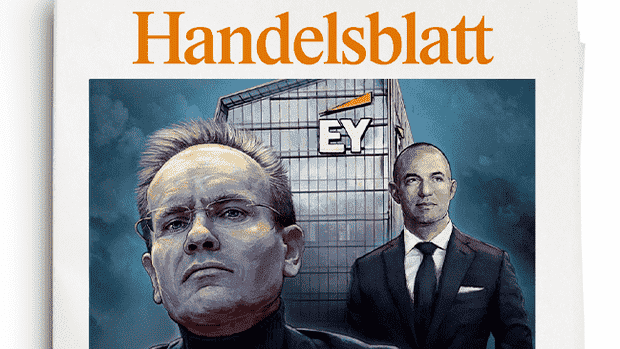Dusseldorf In the scandal surrounding the insolvent Dax group Wirecard, the auditing company EY resorted to legal means. As the “Financial Times” first reported, EY has filed criminal charges against unknown persons because a classified special report about EY’s work as a Wirecard auditor became public.
Martin Wambach, board member of the Institute of Auditors and managing partner of Rödl & Partner, was commissioned in March by the investigative committee of the German Bundestag to examine the work of EY as Wirecard’s auditor. EY had audited the balance sheets of the scandal-ridden payment service provider for almost ten years. When in 2020 billion-sized holes in these balance sheets could no longer be hidden, Wirecard collapsed.
Wambach presented his report to the German Bundestag in April. The document was classified as secret. No one has had access to it since the committee of inquiry ended its work on June 25.
Top jobs of the day
Find the best jobs now and
be notified by email.
Struggle for publication
On June 24, the lawyers of the investigative committee applied to the Federal Court of Justice to lift the secrecy. On August 6, the Federal Court of Justice rejected this. The reason: the committee has since disbanded, the motion is therefore inadmissible.
When the Handelsblatt published the Wambach report on its website, editor-in-chief Sebastian Matthes justified this with the overwhelming public interest in clearing up the Wirecard scandal. Members of the Wirecard investigation committee also welcomed the decision.
More on the Wirecard scandal:
After the criminal complaint from EY, Matthes said: “The Handelsblatt stands by the publication of the Wambach report. It is the job of journalism to control political and economic power, to expose grievances and to create transparency. ”This is what the Handelsblatt did by publishing the Wambach report. Millions upon millions of aggrieved investors would have a right to know how the scandal came about.
After the publication of the Wambach report, the Handelsblatt received countless feedback from readers who supported the move. “It was a mistake on the part of those responsible to keep the Wambach report under lock and key,” said Matthes. “The Handelsblatt has created transparency through the publication so that every reader can get their own picture of the work of the auditors.”
Disastrous testimony for EY
The Wambach team gave EY a bad report for its work at Wirecard. According to this, EY found “significant deficits in accounting” as early as 2015, which were to be assessed as so-called “fraud indicators” and “could have been recognized as such by an auditor”.
According to the Wambach report, the EY auditors missed numerous warning signals. If they discovered abnormalities, they often did not investigate them. The special auditors noted again and again: “No discussion and plausibility check of these anomalies was recognizable by EY.” Or: “According to the auditor’s working papers, however, these inconsistencies were not investigated.”
In the working papers of EY, neither “the necessary critical attitude” was recognizable, nor the “higher risk assessment of an auditor” resulting from the special situation, according to the special report. In the case of the takeover of the Indian Hermes Group, which must be classified as particularly critical, EY “essentially relied on verbal and written statements from people who might be suspected”.
In the case of an important purchase agreement with the Al-Alam group from Dubai, the auditors did not even notice that the name of another company was six times in the contract instead of Al Alam.
EY rejects allegations
EY denied the allegation of wrongdoing. “According to the IDW audit standards, a retrospective assessment does not allow any conclusions to be drawn about misconduct on the part of the auditor,” said an EY spokesman.
“In addition, the investigators were only able to look at individual aspects of the audit activities of EY during their work – also in accordance with the specific design of their investigation mandate and in view of the tight timeframe – and their review of an excerpt of the documents available for the annual and consolidated financial statements audits have restricted. Notwithstanding this, we would like to emphasize that the EY auditors carried out their audits to the best of their knowledge and belief. The audit team took all the information and allegations seriously at all times and carefully investigated them. ”
Nevertheless, the Wirecard affair had already had high-level consequences for EY. On March 19, Hubert Barth appeared before the committee of inquiry. He had headed EY Germany since July 2016. “Even if I have nothing to blame myself personally, the Wirecard case caused damage to many investors and not least to the financial center of Germany, even immense damage,” said Barth.
“In politics there is the term political responsibility for this. As for EY, I have to wear these. … That is why I am resigning from my position as Chairman of the Management Board of EY Germany with effect from April 1, 2021, and I wish my successors all the best. ”
These successors have now apparently decided to take action against those who want to bring transparency to the Wirecard scandal. Before the Handelsblatt took the step, an EY spokesman said: “In general, we face the public interest in investigating the Wirecard fraud case, including in relation to our role as auditor.” of the Wambach report.
“From the point of view of EY, the passing on of the report represents a circumvention of this procedure provided for by the rule of law, violates the supreme court’s authority to make decisions and creates facts on its own,” said the EY spokesman.
“Our criminal complaint expressly does not concern the question of whether the Wambach report may be published. … Rather, we are concerned with the clear disregard for the constitutional procedure envisaged for the publication of the report and the associated violation of personal property rights. ”
More: After the publication of the secret report: “Now nobody can talk their way out”
